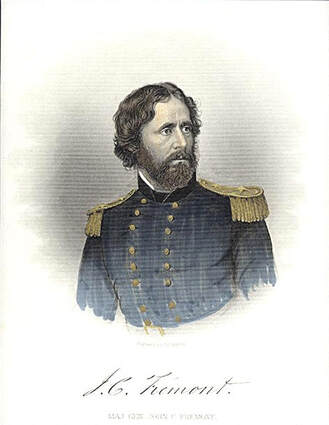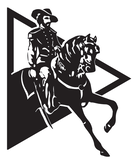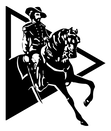
John C. Fremont (1813-1890), one of the most famous and popular of explorers, grew up the illegitimate child of a prominent woman of Virginia society, and a penniless French refugee. The circumstances of his birth made John Charles Fremont an ambitious man, a social climber. Throughout his career he would seek out the patronage of powerful men, first in Charleston, South Carolina, where he went to college, and later in Washington, D.C.
His first important patron was diplomat Joel Poinsett, who obtained for Fremont his first assignment, helping the army survey the southern Appalachian mountains. Poinsett later helped organize the Corps of Topographical Engineers, a group of surveyors and mapmakers at the service of the army. Poinsett saw to it that Fremont was named to the Corps’ first major Western project, an expedition into the country between the upper Mississippi and Missouri Rivers in 1838. The leader of this expedition was Joseph Nicolett, who became Fremont’s mentor and taught him his trade.
Fremont’s next big conquest was to marry Jessie Benton, the daughter of the influential Senator from Missouri, Thomas Hart Benton. Benton, Democratic Party leader for over 30 years in the Senate, championed the expansionist movement, a political cause that became known as “Manifest Destiny”.
Basically the expansionists believed that the North American continent, should belong to the citizens of the United States & and that getting that land was the country’s destiny. This movement became a crusade for politicians like Benton, and his new son-in-law, making a name for himself as a western topographer. He saw in Fremont a great political asset.
Congress appropriated money to be used for surveys of the Oregon Trail (1842), Oregon Territory (1844), the Great Basin and Sierra Mountains to California (1845). Through his power and influence, Benton got Fremont the leadership of these expeditions. Although they seemed like routine surveying trips, making maps and describing the land, Fremont had the unofficial job of writing descriptions that would make the West, and western travel, appear as attractive as possible to Americans living east of the Mississippi. Although only adequate at the first job of making maps and surveying, Fremont proved to be a master promoter in his second job.
With his wife Jessie’s help, Fremont’s written, published accounts of his expeditions became wildly popular with the public, and he became known as the “Pathfinder.” Fremont’s expeditions, while not accomplishing a great deal scientifically, were very important in advancing the cause of “Manifest Destiny”.
Fremont’s later years were not as successful as his expeditions. Although he became wealthy when land he purchased in California struck gold, he lost it all due to poor judgment. He was an unsuccessful candidate for President in 1856 (even his father-in-law publicly sided against him), and during the Civil War he was stripped of his command by President Lincoln. The family eventually had to live off the publication earnings of wife Jessie & in 1890 John C. Fremont “The Pathfinder” died a forgotten man.
Thank you to Dr. William Christensen, for his contribution in providing this biographical piece on John C. Fremont.
His first important patron was diplomat Joel Poinsett, who obtained for Fremont his first assignment, helping the army survey the southern Appalachian mountains. Poinsett later helped organize the Corps of Topographical Engineers, a group of surveyors and mapmakers at the service of the army. Poinsett saw to it that Fremont was named to the Corps’ first major Western project, an expedition into the country between the upper Mississippi and Missouri Rivers in 1838. The leader of this expedition was Joseph Nicolett, who became Fremont’s mentor and taught him his trade.
Fremont’s next big conquest was to marry Jessie Benton, the daughter of the influential Senator from Missouri, Thomas Hart Benton. Benton, Democratic Party leader for over 30 years in the Senate, championed the expansionist movement, a political cause that became known as “Manifest Destiny”.
Basically the expansionists believed that the North American continent, should belong to the citizens of the United States & and that getting that land was the country’s destiny. This movement became a crusade for politicians like Benton, and his new son-in-law, making a name for himself as a western topographer. He saw in Fremont a great political asset.
Congress appropriated money to be used for surveys of the Oregon Trail (1842), Oregon Territory (1844), the Great Basin and Sierra Mountains to California (1845). Through his power and influence, Benton got Fremont the leadership of these expeditions. Although they seemed like routine surveying trips, making maps and describing the land, Fremont had the unofficial job of writing descriptions that would make the West, and western travel, appear as attractive as possible to Americans living east of the Mississippi. Although only adequate at the first job of making maps and surveying, Fremont proved to be a master promoter in his second job.
With his wife Jessie’s help, Fremont’s written, published accounts of his expeditions became wildly popular with the public, and he became known as the “Pathfinder.” Fremont’s expeditions, while not accomplishing a great deal scientifically, were very important in advancing the cause of “Manifest Destiny”.
Fremont’s later years were not as successful as his expeditions. Although he became wealthy when land he purchased in California struck gold, he lost it all due to poor judgment. He was an unsuccessful candidate for President in 1856 (even his father-in-law publicly sided against him), and during the Civil War he was stripped of his command by President Lincoln. The family eventually had to live off the publication earnings of wife Jessie & in 1890 John C. Fremont “The Pathfinder” died a forgotten man.
Thank you to Dr. William Christensen, for his contribution in providing this biographical piece on John C. Fremont.


